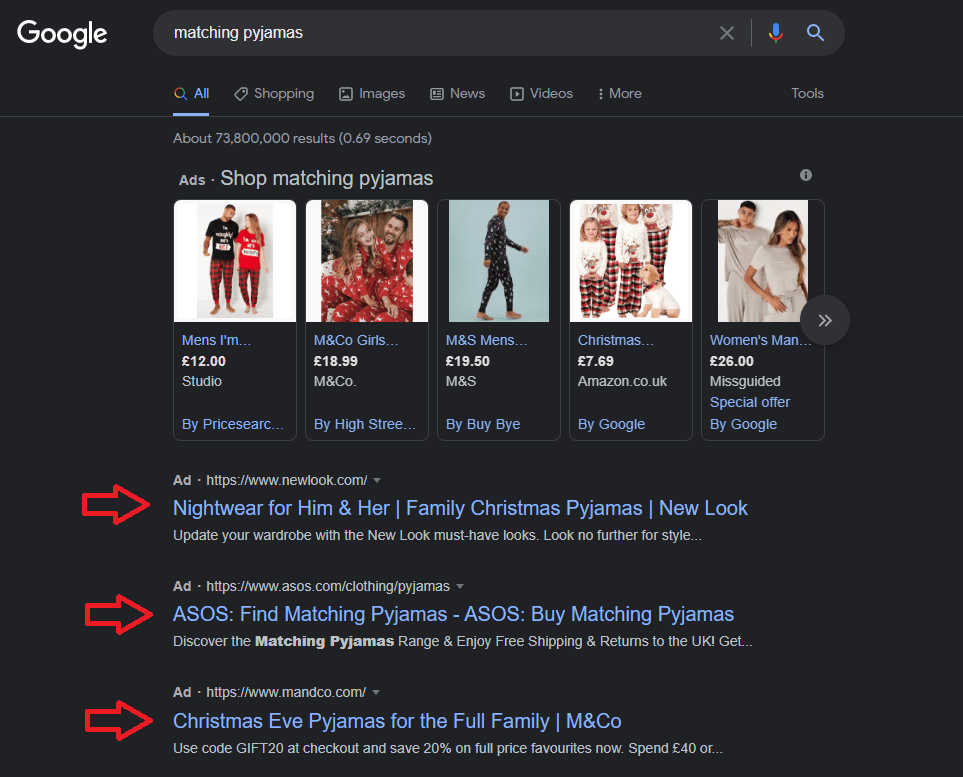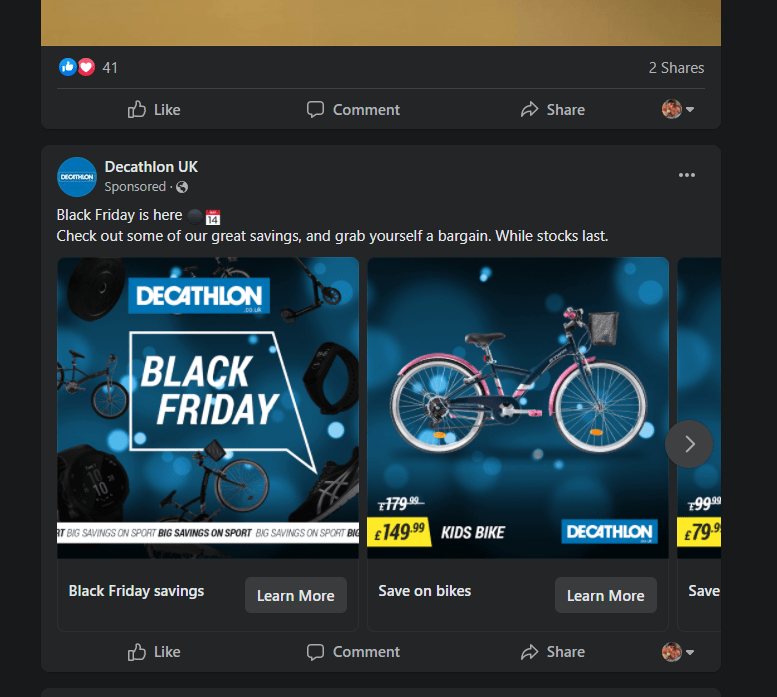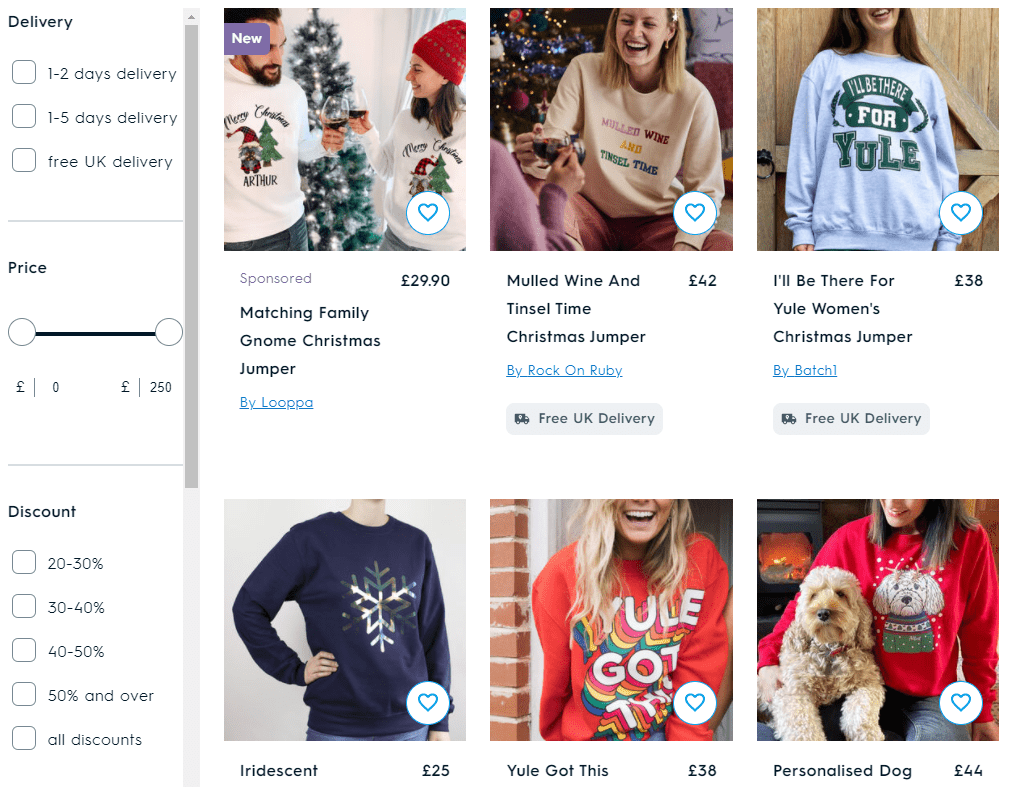PPC means Pay Per Click and essentially means you pay every time someone ‘clicks’ your ad. As opposed to SEO, where you can promote your site for free but it takes a long time, PPC lets you pay to get higher up Google’s search results. But what is PPC?
You’ve likely seen PPC ads every time you’ve searched for something in Google:

What is PPC?
Popular Types of PPC
Google Ads
The most commonly used option available for PPC, Google Ads runs ads that appear in Google search results. To use it, you bid on certain keywords relating to your business, and pay for each click a person makes.
Every time someone searches for something, such as ‘stainless steel kettle’, Google will choose from a selection of advertisers and chooses the most relevant to appear in the ad space on the results page.
Bing
Although not as widely used as Google, Bing has its own version of PPC which allows you to run ads on a selection of Microsoft search properties.
Display Advertising
This essentially covers any paid advertising that includes text, images and a link.
Remarketing
These are ads that ‘follow’ you around the internet after visiting a certain site. For example, looking at a website for cooking pans may lead to adverts from that retailer appearing on other sites you visit. Also a type of Display Advertising
Shopping Ads
Specific for the Shopping tab on Google. Also a type of Display Advertising
Social Media Advertising
Any paid advertising that appears on social media. Also a type of Display Advertising.

How does PPC work?
Keyword Match Types
PPC advertising is essentially based on three keyword match types. These determine which search terms will activate your ads, and how much flexibility each ad has.
Broad Match
This is where the ads are able to appear for searches that include synonyms, related searches, related variations, and even typos. For example, a search under Broad Match for ‘red shoes’ could trigger an ad for ‘red heels’, or ‘red stilettos’.
Phrase Match
This option shows ads for the main keyword, but also includes any words included before or after the keyword, such as ‘red shoes size 6’.
Exact Match
Exact match options only show for the exact keyword or very close variations. This means you can really control which search terms will trigger you ad – which is useful if you have a tight budget.
What makes up a PPC ad?
Campaign
This is the group that your ads sits in. It is useful if you have many ads in different categories. For example, you might have ‘women’s clothes’ and within that include ads for women’s dresses, women’s trousers, women’s coats, and women’s jumpers.
Ad Group
This is the next level down from Campaign – within your women’s clothes campaign, you might have an ad group of women’s jumpers and then within that; women’s Christmas jumpers, women’s summer jumpers, women’s woolen jumpers, etc…
Keywords
This is the search term that your ad is based on. Using the Keyword Match Types, you can control how the keywords have triggered your ad. It requires a decent amount of keyword research before you begin but it is very useful.
Ad Text
This is the content of your ad – something catchy and relevant that will make the person looking through the results to choose your ad.
Landing Page
This is the page that the person will land on once they click your ad. You want to make sure it is relevant to the ad – so if your ad is for women’s Christmas jumpers, make sure they land on that category of products, and not a generic women’s jumpers page, or your homepage.

The tools of PPC
There are many tools within PPC that allow you to control and tailor your advertisements. Here are some of the most commonly used;
Bid Adjustments – allows you to control the maximum and minimum CPC (cost per click) – this is how much you are bidding for a certain keyword.
Location Targeting – Allows you to target your ads to specific locations to maximise the chance of someone clicking through and making a purchase.
Ad Schedule – Allows you to dictate when your ads appear, so if you know your customers are more likely to be about in the morning, you can ensure you ads only appear then.
Campaign Budget – Allows you to set a daily budget for your ads
Why Use PPC?
What is the benefit of PPC over the free option of SEO?
1) PPC can generate clicks very quickly, as opposed to SEO which can take months to gain traction. PPC can start bringing visitors to your website within just a few hours.
2) PPC is very easy to track and monitor – with tools that allow you to review the success of every ad, and show you where you need to improve to gain more clicks.
3) You can set your budget, so even though PPC is paid, you won’t spend more than you’re willing to, and you can automate the process to make sure you don’t overspend.
4) You can target customers with precision with PPC, allowing you to focus on specific browsing habits, locations, previous purchasing habits, and even by job title.
5) There is a lot of choice available with PPC – you can just run Google Ads, or Shopping, or you can cover a multitude of avenues, including social media, remarketing, Bing ads, and more.
6) You can also run PPC alongside SEO – in fact this is best practice if you really want to make your business a success. Running both at the same time means you get the quicker wins with PPC, but also are planning for the long-term with SEO.
If you are interested in learning more about what PPC can do for you, contact us and arrange a chat with our experienced marketing team.